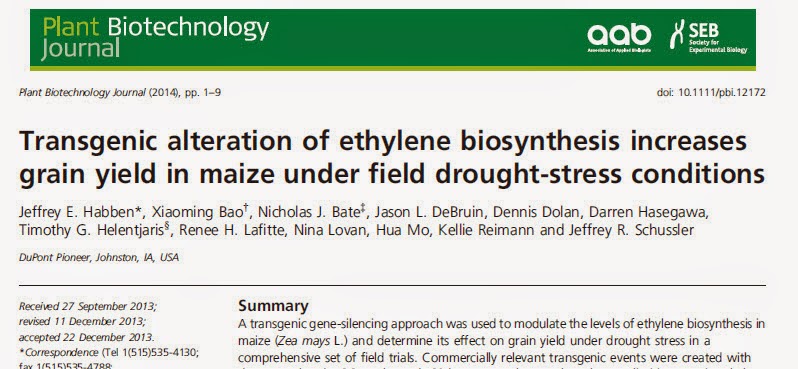| Online: | |
| Visits: | |
| Stories: |

| Story Views | |
| Now: | |
| Last Hour: | |
| Last 24 Hours: | |
| Total: | |
Global march of drought tolerant crop varieties part 2. Altered ethylene improves grain yield in maize.
Summary
A transgenic gene-silencing approach was used to modulate the levels of ethylene biosynthesis in maize (Zea mays L.) and determine its effect on grain yield under drought stress in a comprehensive set of field trials. Commercially relevant transgenic events were created with down-regulated ACC synthases (ACSs), enzymes that catalyse the rate-limiting step in ethylene biosynthesis. These events had ethylene emission levels reduced approximately 50% compared with nontransgenic nulls. Multiple, independent transgenic hybrids and controls were tested in field trials at managed drought-stress and rain-fed locations throughout the US. Analysis of yield data indicated that transgenic events had significantly increased grain yield over the null comparators, with the best event having a 0.58 Mg/ha (9.3 bushel/acre) increase after a flowering period drought stress. A (genotype × transgene) × environment interaction existed among the events, highlighting the need to better understand the context in which the down-regulation of ACSs functions in maize. Analysis of secondary traits showed that there was a consistent decrease in the anthesis-silking interval and a concomitant increase in kernel number/ear in transgene-positive events versus nulls. Selected events were also field tested under a low-nitrogen treatment, and the best event was found to have a significant 0.44 Mg/ha (7.1 bushel/acre) yield increase. This set of extensive field evaluations demonstrated that down-regulating the ethylene biosynthetic pathway can improve the grain yield of maize under abiotic stress conditions.
Jeffrey E. Habben, Xiaoming Bao, Nicholas J. Bate, Jason L. DeBruin, Dennis Dolan, Darren Hasegawa, Timothy G. Helentjaris, Renee H. Lafitte, Nina Lovan, Hua Mo, Kellie Reimann and Jeffrey R. Schussler
Plant Biotechnology Journal Article first published online: 12 MAR 2014 DOI: 10.1111/pbi.12172
© 2014 Society for Experimental Biology, Association of Applied Biologists and John Wiley & Sons Ltd
Source: http://gmopundit.blogspot.com/2014/04/global-march-of-drought-tolerant-crop.html




